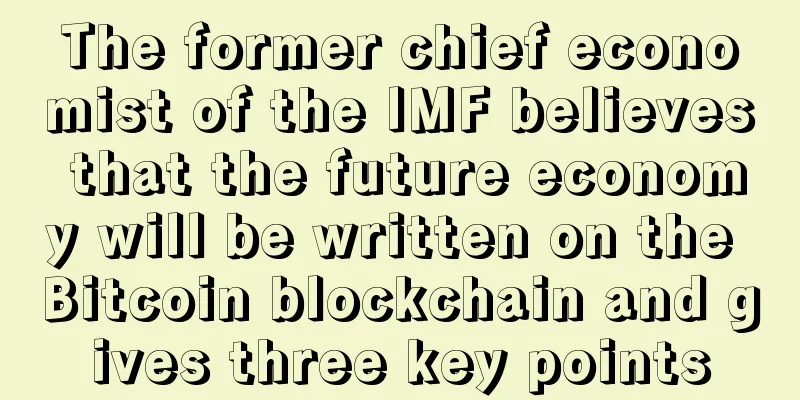The former chief economist of the IMF believes that the future economy will be written on the Bitcoin blockchain and gives three key points

|
Simon Johnson, former chief economist of the IMF and professor of global economics and management at MIT, attaches great importance to blockchain. He is a prominent figure in the transition economy. In addition, he believes that global decision makers are also open to the promising distributed ledger. Simon Johnson, Professor of Global Economics and Management at MIT He spoke to many MIT alumni and students:
In 2009, a newly established podcast called Planet Money had the opportunity to talk with then-U.S. Treasury Secretary Timothy Geithner, just one month after his new boss, President Obama, took office. Johnson also joined Obama's team. As the former chief economist of the International Monetary Fund (IMF), he gave his professional views on the economic crisis. It was a great moment in the history of podcasting, and Johnson became a regular on the new show. Johnson made three points about a new moment in financial history: the arrival of blockchain. He was speaking at the 'FinTech and Financial Disruption' conference. During his brief speech, an energetic Johnson paced the stage, physically expressing his excitement about Satoshi Nakamoto’s immutable innovation, the blockchain, the public database that powers Bitcoin. He made three key points about distributed ledgers and the future of finance from a personal perspective. The first point — that the transformation brought about by the adoption of blockchain technology will be profound — is based on the hype cycle of bitcoin, but Johnson warned the audience not to judge the technology too much from an American perspective. He said:
In areas where financial intermediaries are dysfunctional or where currencies are out of control. For example, El Observer reported that an Argentinian company used Bitcoin to dominate the interest rates on consumer loans. The second point he made came in the form of a question: “What will the protocol look like for how we record these P2P financial transactions?” Will it be a public ledger , like the one that runs Bitcoin? Or a private ledger run by trusted nodes (maybe big banks), enabling large investors to move money in secret? (The Observer proposed a third option: a hybrid ledger .) Johnson said:
As a professor at MIT, he said, "Here I see employers training excellent engineering graduates." He believes that young talents are often a good leader in the innovation process. Finally , blockchain-related regulation is coming, but regulators may not be hostile to this technology. He said:
He warned:
In fact, just this morning the Bank of England announced a public consultation period on the interoperability of the system that settles up to £500 billion a day in the UK with a public ledger or blockchain. |
<<: The 8th Annual Fintech and Payment Innovation Event
>>: Blockchain experts launch Zeppelin, the first secure and reliable smart contract framework
Recommend
With capital continuing to flow into the market, will Bitcoin soon experience volatility?
Despite Bitcoin temporarily hitting a yearly high...
The face of a woman who likes to spend money casually when she has money
Making money is sometimes just a matter of luck. ...
Women's faces are definitely not the first choice for partners
Women's faces are definitely not the first ch...
6 graphics cards fully open for mining editor to teach you how to build a Bitcoin machine
6 Graphics cards are fully powered just for minin...
What does a mole on a girl's left clavicle mean? A mole on the right clavicle brings good luck to a woman
What does a mole on the clavicle mean? Is it good...
Coin Zone Trends: Bitcoin Price Trends Based on Big Data This Week (2016-09-22)
The bullish momentum is still insufficient and th...
Former Vice Chairman of the China Securities Regulatory Commission: Sichuan has the largest BTC mining scale in the country, and can take this opportunity to study the relationship between blockchain and digital currency
According to Sichuan Daily, on October 27, at the...
Syscoin creator introduces blockchain foundry, plans to launch block market
The creators of Syscoin, a cryptocurrency that re...
What does a mole on a woman's nose mean?
What does it mean if a mole on the tip of a woman...
Myanmar trials blockchain technology for microfinance
Rage Review : The demand for microfinance in Myan...
Will men with dewlap on the tip of their nose be responsible in relationships? Is it good to have a fleshy nose?
Everyone's emotions are different. Some men ar...
Floods and DeFi boom: A dangerous August for crypto miners
Source: BlockBeats, author: 0x66, original title:...
In-depth analysis of ENS: Its leading position is unshakable but it lacks a token empowerment mechanism
Original title and link: "ENS sees the light...
Vote for Bitcoin!
With three days left before the SXSW Panel Picker...
Your feet tell you how much wealth you can have in your life
Your feet tell you how much wealth you can have i...









